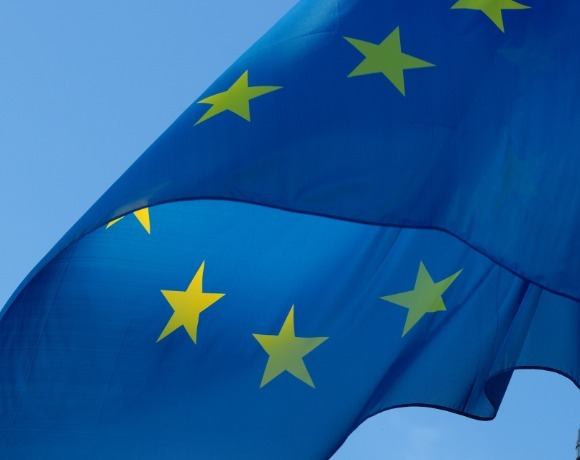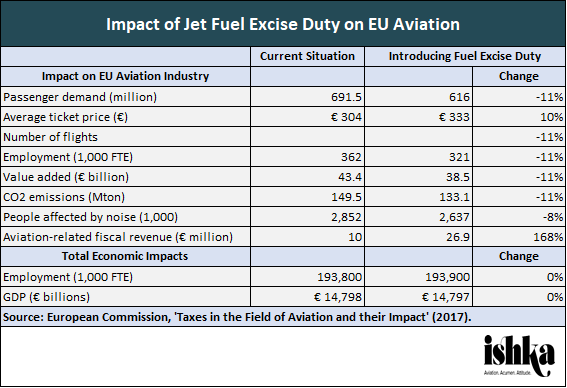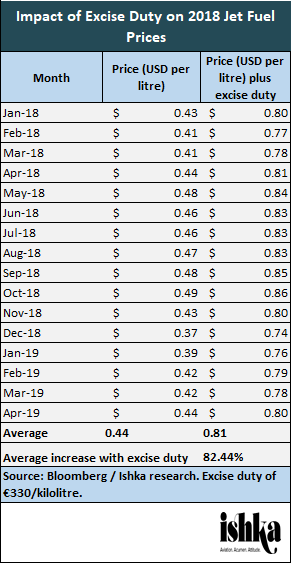in Airline trends & analysis , ESG & Regulation
Friday 31 May 2019
Update: €0.33/litre European jet fuel tax on the cards after EU elections

Correction: This report has been updated to indicate that new excise duty would have translated to an 82.44% increase in 2018 - 2019 fuel prices.
An EU jet fuel tax of €330 ($368) per kilolitre is on the cards after the recent European elections. All of the four parliamentary groups likely to form the next European Parliament are in favour of taxing aviation jet fuel, which Ishka estimates would have been an 82.44% increase on 2018 - 2019 fuel prices.
The election comes the same month that a leaked European Commission report concluded that introducing certain jet fuel taxes would have a “significant[ly] negative” impact on the aviation industry, but a “close-to-zero” impact on each EU Member State’s fiscal revenue, GDP and employment.
The report predicted a jet fuel tax of €330/kilolitre would increase ticket prices by 10% across Europe, while cutting both passenger demand and the sector’s CO2 emissions by 11%. €330/kilolitre ($368/kilolitre) is the minimum taxation allowed on aviation fuel under the EU’s 2003 Energy Tax Directive.
Europe’s “green wave”
The previous EU power-holders, the European People’s Party (EPP) and the Socialist and Democrats (S&D), lost their traditional majority in May’s election for the first time since 1979, with a combined 86-seat decrease between them.
Instead, alongside gains by the far right, a so-called “green wave” has swept through Europe. The next two biggest parties were the Alliance of Liberals and Democrats for Europe (Alliance) and the Greens/European Free Alliance (Greens), at 13% and 11.1% of the vote gained respectively.
All of these top four political groups have publicly declared their support for an aviation fuel tax. The Socialist and Democrats leader, Frans Timmermans, wants jet fuel taxed “unconditionally and quickly”. Establishing a commercial aviation fuel tax is part of both the Alliance party and the Greens’ manifesto, with the Alliance party calling its current exemption from tax “obsolete” and the Greens making jet fuel tax a part of points one, three and six in its “priority measures”. The EPP’s leader, Manfred Weber, also gave a ‘yes’ to whether there should be a tax on jet fuel on POLITICO’s EU Confidential podcast on 25th April.
What would an EU jet fuel tax look like?
None of the parties likely to form the next EU coalition have laid out an explicit proposal for taxing jet fuel. However, the European Commission’s leaked report models a €330 ($368) per kilolitre excise duty – a tax imposed on goods that damage public health or the environment. Excise duty is payable on goods both produced or imported into the EU to whichever Member State the goods are consumed in.
Click here to download the data behind the chart.
Currently, fuel for international commercial aviation is exempt from taxation in the EU under the 2003 Energy Tax Directive, itself following the 1944 Chicago Convention. The European Commission, however, writes that this exemption only applies to fuel already on board the aircraft and not fuel taken in at an aircraft’s destination.
Under EU law, Member States can create bilateral agreements to tax fuel used in domestic flights “without limitation” as well as on flights within the European Economic Area. The European Commission’s report models for an excise duty applied in these circumstances. The European Federations NGO Transport and Environment group estimates that a kerosene tax at 33 cents a litre would raise €9.2 billion a year for the EU.
Correction: Ishka previously stated that the increase in fuel costs across 2018 and 2019 would have been 4%. It would actually have been on average 82.44%.
Click here to download the data behind the chart.
A €330/kilolitre excise duty would have meant an 82% increase on average on 2018 - 2019 jet fuel prices. However, given any jet fuel tax imposed would likely only apply to domestic and intra-EU flights, it is difficult to estimate how much a European airline’s overall fuel bill would rise. The International Air Transport Association (IATA) estimates that fuel is 22.4% of an airline’s total costs industry-wide, and that European airlines sit on this average.
The Ishka View
If the majority of the next EU coalition backs an aviation jet fuel tax, there is a strong possibility that one will be passed, whether it is “significant[ly] negative” for European aviation or not. At least three of the likely parliamentary groups (the Greens, the S&D and the EPP) are indeed seeking to reduce short-haul European aviation – S&D’s leader, Timmermans, even supports a “total ban” on such flights.
It is not clear, however, what an EU aviation fuel tax would look like. None of the EU political groups in question have put forward a specific aviation fuel tax plan and S&D leader Timmermans’ statement that jet fuel should be taxed “unconditionally” is undoubtably hyperbolic. The most likely form such a tax would take is the one outlined in the European Commission’s report: a €330/kilolitre excise duty on fuel that airlines upload for use on domestic and intra-EU routes.
IATA calculates that fuel is around a quarter of total costs for European airlines, so any increase – even if only applied to some routes – would be a substantial financial hit for many airlines. An 82% increase, however, is particularly substantial. Many recent airline bankruptcies have demonstrated the impact that reduced demand/revenues coupled with rising operating costs can have on airline performance and a new tax would certainly make airlines more vulnerable. Given that the EU’s €330/kilolitre minimum has been in place since 2003, it is unlikely that the tax rate would be flexible in the face of fluctuating fuel costs.





Sign in to post a comment. If you don't have an account register here.